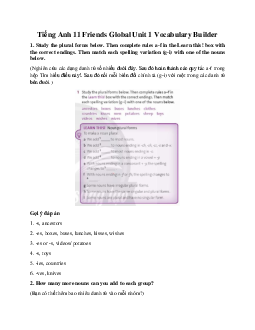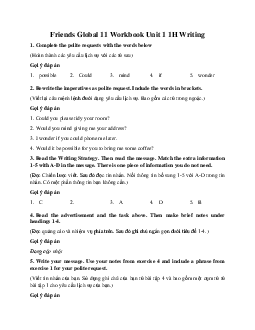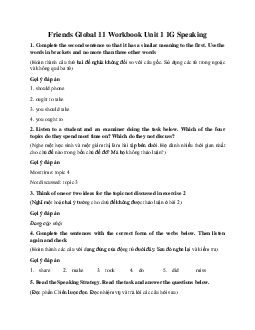



Preview text:
Tiếng Anh 11 Friends Global Unit 1 1C Listening
1. SPEAKING Work in pairs. Look at the photo. What do you think this app does?
Why might some people need it?
(Làm việc theo cặp. Nhìn vào bức hình. Bạn nghĩ ứng dụng này làm gì? Tại sao một số
người có thể cần nó?) Gợi ý đáp án
I think this app relates to mealtimes. I can see the kid's smartphone and parent’s
smartphone. This app may prevent children from using devices while eating breakfast,
lunch or dinner. In my opinion, some people, especially some parents, need it because
nowadays, children always glue their eyes to the screen all the time, even when they are
eating. Therefore, most parents use this app to help their kids have quality time when they are having meals.
2. SPEAKING Read the text and check your answer to exercise 1. Do you think the
app would increase or decrease the number of arguments in your family? Why?
(Đọc văn bản và kiểm tra câu trả lời của bạn cho bài tập 1. Bạn nghĩ ứng dụng này sẽ làm
tăng hay giảm số lần cãi vã trong gia đình bạn? Tại sao?) Gợi ý đáp án
I think the app would decrease the number of arguments in your family. At first, this can
cause a lot of arguments because the children aren't used to using no devices while
eating. However, after one or two weeks, the children can have a new healthy habit
without smartphones or tablets during mealtimes. After that, they will feel free to share
everything with their family and like to have good moments when the family are eating
together. Therefore, everyone can understand each other more clearly, enjoying quality
time and even the number of arguments would decrease.
3. VOCABULARY Work In pairs. Check the meaning of the adjectives below.
Which describe a positive attitude? Which describe a negative attitude?
(Làm việc theo cặp. Kiểm tra ý nghĩa của các tính từ dưới đây. Cái nào mô tả một thái độ
tích cực? Cái nào mô tả một thái độ tiêu cực?) Gợi ý đáp án
- Adjectives describe negative attitude: aggressive, arrogant, miserable, nostalgic, -
pessimistic, sarcastic, urgent, bitter
- Adjectives describe positive attitude: calm, complimentary, enthusiastic, optimistic, sympathetic, grateful
4. Read the Listening Strategy. Then listen and underline the adjective which best
matches the speaker's attitude. Use their tone of voice to help you.
(Đọc Chiến lược nghe. Sau đó lắng nghe và gạch dưới tính từ phù hợp nhất với thái độ
của người nói. Sử dụng giọng điệu của họ để giúp bạn.) Gợi ý đáp án 1. pessimistic 2. aggressive 3. complimentary 4. sympathetic Nội dung bài nghe
Speaker 1: We’ve got a big family dinner tonight. I expect there’ll be an argument. There
usually is. That’s why I hate these dinners. They always end badly.
Speaker 2: Hey! Get out of my chair! I want to sit there. I can’t see the TV if I sit on this
side of the table, can I? Come on, hurry up!
Speaker 3: You’re looking well. Is that a new shirt? It’s very nice. I love the colour - it really suits you.
Speaker 4: I’m so sorry you didn’t pass your test. You must be very disappointed. But
don’t worry, you can take it again next month - and I’m sure you’ll pass it then.
5. SPEAKING Listen and compare two different ways of saying the sentences. Then,
in pairs, say a sentence in one of the two ways. Can your partner guess the adjective?
(Nghe và so sánh hai cách nói khác nhau của câu. Sau đó, theo cặp, nói một câu theo một
trong hai cách. Bạn của bạn có thể đoán tính từ không?)
6. Work in pairs. Listen to four speakers and decide which speaker sounds:
(Làm việc theo cặp. Nghe bốn người nói và quyết định người nói nào nào nghe có vẻ)
7. Listen again. Match sentences A-E with speakers 1-4. Use the tone of voice to help
you. There is one extra sentence.
(Lắng nghe một lần nữa. Ghép câu A-E với người nói từ 1-4. Sử dụng tông giọng nói để
giúp bạn. Có một câu bị thừa.)
8. SPEAKING Work in pairs. Decide which of these topics is most likely to cause
arguments in your family and why. Are there any others you can think of? Compare
your ideas with the class.
(Làm việc theo cặp. Quyết định chủ đề nào trong số những chủ đề này có nhiều khả năng
gây ra tranh cãi trong gia đình bạn nhất và tại sao. Bạn có thể nghĩ ra thêm những cái
khác không? So sánh ý tưởng của bạn với lớp học.) Gợi ý đáp án
- In my opinion, too much time spent on social media and games is the most likely to
cause arguments in the family. For example, I have one younger brother, he is 14 years
old, and he really likes playing on his smartphone. He can spend all of his free time using
smartphone for entertainment and games. As a result, he ignores his studying and my
mom and my dad have to force him to study a lot but he doesn't like it. This makes my
parents angry and unsatisfied. They always shout at my brother, and he is becoming more
and more aggressive. Therefore, my family always has an argument about this problem.
- Some topics that cause arguments in families that I can think of are: what to see on TV,
where to hang out, what kind of household appliance to buy, how to use money…




